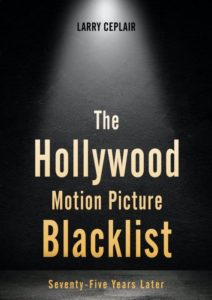One of the most interesting things for me to read about is old Hollywood. From the fashion looks to how things were politically, everything about that world is utterly fascinating to me. So I was happy to have the chance to revisit that world again through Larry Ceplair’s amazing new book The Hollywood Motion Picture Blacklist: Seventy-Five Years Later.
One of the main things I liked about this book is its description of old Hollywood.
Conveying one of the darkest times in Hollywood history in 400 pages is no easy task, and this book pulls it off brilliantly. Set during Hollywood’s infamous blacklist era, this book covers the tale of Hollywood Communism and how it changed not only the blacklisted screenwriters’ lives but the Hollywood system itself. From what everybody wore during its time period to how those involved came up with the awful and the great ideas that escalated and then de-escalated the crisis, everything here is described perfectly, one of the book’s biggest strengths.
The book talks about how during the Cold War there was a lot of debate among Hollywood elite about whether or not there was too much Communism in Hollywood at that time. This led to a lot of people working in Hollywood getting blacklisted. This was, arguably, the most devastating time in history for writers in Hollywood, particularly when it came to finding work. Some of them even were unable to accept Oscars. (A famous example being Dalton Trumbo, who won best original screenplay for the romantic drama Roman Holiday but because he was blacklisted, front writer Ian Mclerran Hunter—who did no work on the film—accepted his Oscar for him. To be fair, in 1993 the Academy did award him full credit for his work on the film as well as an apology, so all’s well that ends well, I guess.)
This novel also does a great job in showing how the blacklist era affected everyone on an individual level. From the people who were blacklisted to Hollywood’s behaviour in general, every perspective is given its fair due, which is really important in any form of writing. Ceplair does a brilliant job with this aspect.
The only thing I didn’t like about the book is its length. Unfortunately, sometimes it does give a little more information than the audience really needs, which grinds everything to a halt.
But even though The Hollywood Motion Picture Blacklist sometimes suffers from a little information overload, it’s still an engaging ride for readers that are into its subject matter, and it’s one of the better books I’ve read all year.

